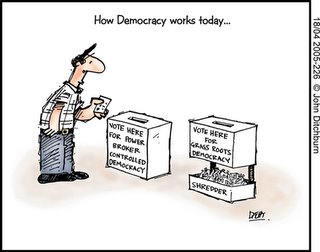STANDING UP FOR OUR RIGHTS
 Politicians generally cop a lot of flak. It is part of the job. This includes the members of our own Legislative Assembly. Now our M.L.A's may have their shortcomings, both individually and collectively....but they are our representatives, we put them there, they are our own people. And if you watch Question Time in the Federal Parliament, as I do, I think our M.L.A.'s measure up pretty well when it comes to conducting themselves with dignity, decorum and sincerity.
Politicians generally cop a lot of flak. It is part of the job. This includes the members of our own Legislative Assembly. Now our M.L.A's may have their shortcomings, both individually and collectively....but they are our representatives, we put them there, they are our own people. And if you watch Question Time in the Federal Parliament, as I do, I think our M.L.A.'s measure up pretty well when it comes to conducting themselves with dignity, decorum and sincerity.Have you noticed how the Australian Government, the Minister and DOTARS have been treating our elected government with absolute disrespect and disdain? I myself heard Minister Lloyd publicly and rudely undermine them during his visit. When he met with them, he refused to discuss with them anything other than what was on his own agenda.
That makes me, as an elector, feel personally insulted and very angry.
But I should not be surprised.
From the time in 1856 when the Pitcairners were duped into believing this island was being given to them, to the present day, the attitude of the Colonial and Australian government has been, at best, one of benevolent paternalism, and at worst, outright trampling on our democratic rights.
In 1896, when Governor Hampden decided to bring to an end 140 years of the Pitcairn/Norfolkers managing their own affairs, the first that many of the islanders knew about it was by reading the Sydney Morning Herald! Their protests were coldly overridden. The response of the committee of one of the three investigations into the Island at that time was to refer to the "pernicious doctrine of democracy."
In 1913, when plans were afoot to place the island under the Commonwealth of Australia, the Minister who moved the Norfolk Island Bill in Federal Parliament was asked whether the Norfolk Islanders had been consulted on the issue of the change in their constitutional staus. The reply was
"They know what is going on; but no, they have not been consulted by the government."
Then in 1962, in an article in the Pacific Islands Monthly, the then President of the Norfolk Island Council. F.J. (Jim) Needham wrote:
"PIM in October reported the Minister for Territories, Mr Hasluck, as saying he did not regard the political views held by the majority (seven out of eight) of the present Council as necessarily being the will of the people. The Council, he said, did not have a mandate, because people voted for different reasons." ("What Does Norfolk Want?" by F.J. Needham, P.I.M. January 1962)
In 1977, more than two-thirds of electors on the island signed a Solemn Declaration that they supported the Norfolk Island Council and wanted Norfolk Island to remain a distinct and separate territory...with its own system of laws, taxes and benefits.
Minister Reg Withers dismissed these declarations as "totally, completely and utterly valueless." The same Minister also refused to receive a N.I. Council delegation when it travelled to Canberra. (Norfolk Island, Australia and the U.N. Vol. 2 - United Nations Association of Australia)
The attitude of contempt for local democracy continues to present times. The December 2003 report of the Joint Standing Committee states, referring to Norfolk referenda:
"referendums allow tyranny by the majority" !!! (p.112 Quis custodiet ipsos custodes? Dec 2003 )
They also accused us of using intimidation to manipulate results. I have visions of the senior members of our community who usually man the polling booths wielding big sticks and standing over people to force them to put their cross in the right box!

On Monday, addressing Federal Parliament, British P.M. Tony Blair urged Australia to continue the fight to establish democracy throughout the world. Yesterday, I heard Foreign Minister Downer holding up Australia's system of liberal democracy as a shining model in contrast to the system in China.
I wonder if Australia has any idea of what democracy is, unless it follows exactly their own model! They seem very "blinkered" when it comes to other people.
I believe it is time we told Australia - and the rest of the world - that we have been the victims of a high-handed, undemocratic, colonial-style rule for too long. This is the 21st century. Australia's hypocrisy, and contempt for Norfolkers' rights must not be allowed to continue any longer.


























